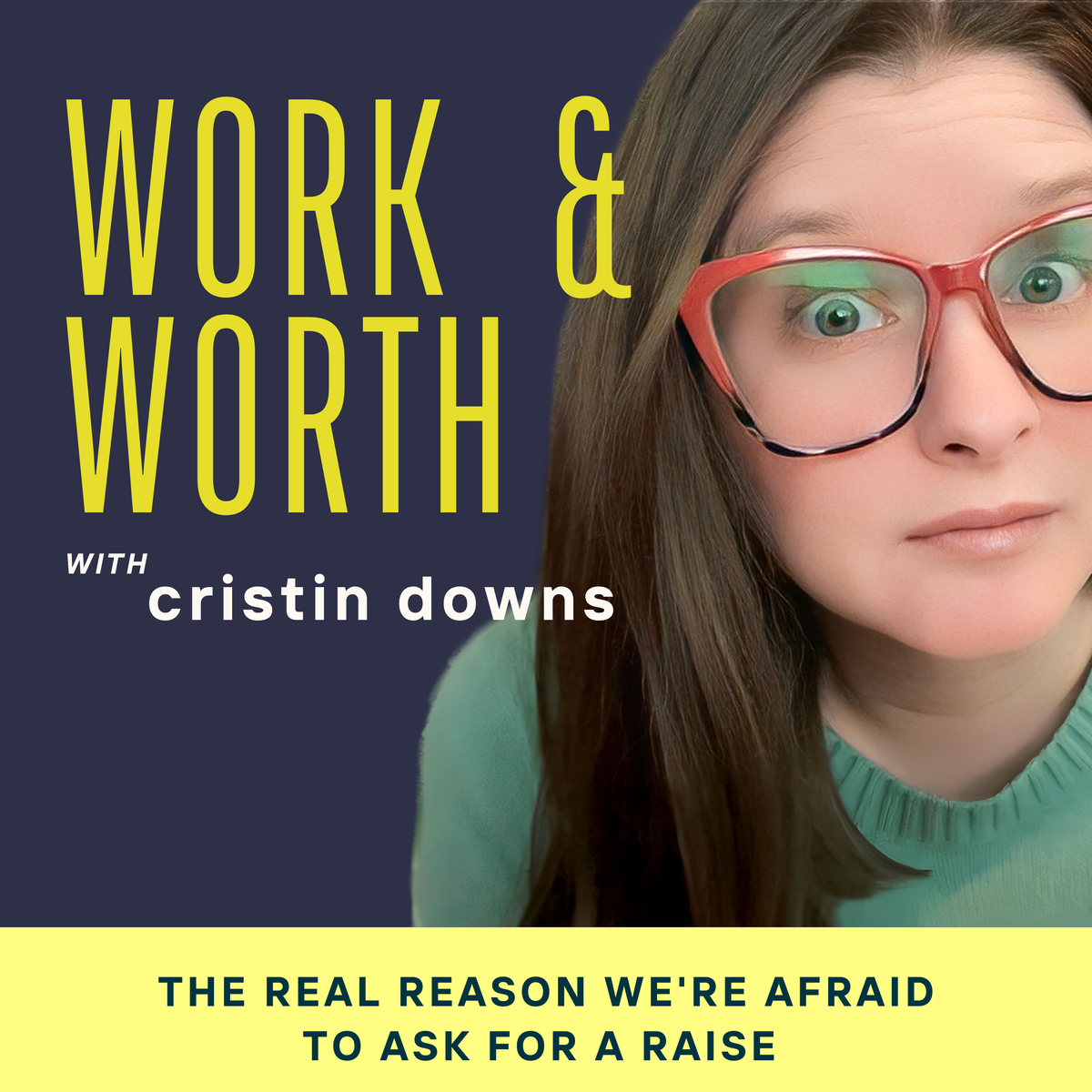If you're like most people, you've known it's been time to ask for a raise, but just. can't. make. the. ask. Let's talk about why. (Hint – it's not you.)
A lot of the way that we feel about money is because our workplaces tell us that we're not allowed to talk about it with each other, but we're also not allowed to talk about it when we're applying for a job.
Welcome to the Work and Worth podcast! In today's episode, we're diving deep into a topic that often brings a lot of anxiety and hesitation—asking for a raise. Why is it such a daunting task for so many of us, and how can you overcome the fear and do it anyway? We'll explore the societal and systemic reasons that make discussing money so uncomfortable, from workplace norms to broader cultural taboos. Plus, I'll share actionable strategies to help you prepare for this crucial conversation, including visualizing the tangible benefits a raise would bring to your life and planning your next steps if your request is denied. So, if you’ve ever felt uneasy about asking for what you truly deserve at work, this episode is for you.
In specifics I talk about:
- Societal discomfort with discussing money
- Job application process and pay transparency
- Psychological and practical barriers to asking for a raise
- Fear of change
- Strategies for asking for a raise
Timing overview:
00:00 Society's fear of us discussing our salaries.
03:25 Progress on pay transparency, but still problematic.
07:42 Financial stability challenges, seeking tangible benefits.
09:23 Consider other roles, industries for better pay.
Important links from the episode (affiliate links might be included):
- Check out my website
- Find me on Instagram (and DM me!)
- Start a free virtual strategy session
- See all the ways we can work together, including DIY options
- Join the free community
Click here to listen on more than a dozen platforms!
Transcript
Hello. Cristin Downs here. This is The Work and Worth Podcast. I'm so happy that you are here with me today. I am a possibilitarian. I believe that there are opportunities in the world that we don't see because we're stuck in an old way of thinking, an old story of ourselves. I'm an executive coach who specializes in career pivots, work, and worth.
Today, we are going to talk about raises. Specifically, we will discuss why people are scared to ask for a raise. I have a somewhat unconventional opinion about this.
First and foremost, in our society, people don't like talking about money. Part of the reason is that we are told we are not supposed to talk about money, particularly in our workplaces and with our coworkers, about how much we're getting paid. This norm prevents people from knowing the pay differences between themselves and their colleagues. It's a way for the owner class to mask pay discrepancies, which can often be based on racism, sexism, and discrimination against parents, especially mothers.
A lot of the discomfort around money stems from our workplaces telling us that we're not allowed to discuss it with each other or when applying for a job. Many job postings do not discuss pay until the job is actually offered.
I once applied to be the director of a national theatre organization. I made it to the final round and was sitting in the New York City office with the hiring team. They offered me the position with a salary of $40,000 a year, which was $25,000 less than I was making at the time. I backed out of the room laughing hysterically and apologized for wasting each other's time before leaving.
This experience is common. It is considered rude to ask about pay before moving forward in the application process. Many places hide the pay details in their postings to avoid current employees knowing how much they are offering. They also want to have some flexibility to adjust the pay.
There has been significant progress on pay transparency, but challenges remain. Many states and cities have introduced laws requiring pay disclosure, but companies often find ways around it. Some require you to call a number to find out the pay, or they post a wide range, such as $100,000 to $300,000.
One of my clients recently experienced this. The job posting listed a range of $100,000 to $160,000. My client was looking for $150,000, so they applied. After several interview rounds, the company stated that the position would start at $140,000, with the potential to reach $160,000 in the future. This client would not have applied if they had known this from the start.
The issue is not with employees being uncomfortable talking about money; it's a structural and systemic problem. Our society makes it difficult to discuss pay connected to work. This is ironic given our society's obsession with status and money.
In addition to societal issues, people don't like to make changes. If you believe you're underpaid and decide to ask for a raise, you must consider what you will do if you don't get it. Complaining without asking allows you to avoid making a decision. If you ask and are declined, you must decide your next steps, which often means finding a new job.
I work with many clients on preparing for their annual reviews, which often includes asking for a raise. I always ask them what they will do if they don't get it. This is not a question they usually consider. There are many articles, especially aimed at women, about asking for more money. People think there is a magical negotiation tactic that will guarantee success. In reality, true negotiation only happens if you are willing to walk away. Without that willingness, you have no real leverage.
To overcome the fear of asking for a raise, think about the tangible benefits it will bring to your life. Will you be able to take more vacations? Will it be easier for your kids to participate in activities? Will you have more financial freedom? Many people I work with struggle financially, often overdrawing their bank accounts. Consider how extra money would improve your life.
You also need to decide in advance what you will do if you don't get the raise. Humans tend to normalize their current circumstances. Think about your options: moving to a different department, applying for other roles, taking on consulting gigs, or even changing industries if necessary.
Most people ask for a raise because they need it, not just because they feel they deserve it. If you don't get the raise, it makes sense to leave. If you are considering asking for a raise, think about the tangible effects it will have on your life and what you are willing to do if you don't get it.
If you want to discuss this further, you can send me a message on Instagram at Work and Worth Coach. You can also visit my website, workandworthcoach.com, to schedule a call and discuss a strategy. I'm happy to help you plan your ask.
Okay, that's it for now. Have a great day.

